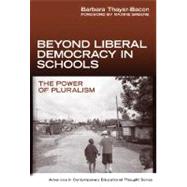
| Series Foreword | p. ix |
| Foreword | p. xi |
| Acknowledgments | p. xiii |
| Current Democratic Theories | p. 1 |
| Renascent Liberal Democracy | p. 8 |
| Strong Democracy | p. 16 |
| Deliberative Democracy | p. 20 |
| Radical Democracy | p. 25 |
| Conclusion | p. 30 |
| Shared Responsibilities | p. 33 |
| Arrival and Departure | p. 36 |
| Parental Relations with the School | p. 39 |
| Connecting Theory with Practice, Part I | p. 41 |
| Students' Roles in the Schools Visited | p. 44 |
| Connecting Theory with Practice, Part II | p. 48 |
| Conclusion | p. 52 |
| Shared Authority | p. 55 |
| "Yes, Madam" | p. 57 |
| "Anyone Not a Happy Child?" | p. 59 |
| Connecting Theory with Practice, Part I | p. 63 |
| "Invest in Your Future!" | p. 69 |
| "Take Care of Your Business" | p. 72 |
| Connecting Theory with Practice, Part II | p. 75 |
| Conclusion | p. 80 |
| Shared Identities | p. 83 |
| The Rez | p. 84 |
| "A Street Is Something You Walk On" | p. 87 |
| "Where Are the Native Americans?" | p. 89 |
| Connecting Theory with Practice, Part I | p. 91 |
| "Creating a New Generation of Warriors" | p. 93 |
| "Education Is Like a Medicine" | p. 97 |
| Connecting Theory with Practice, Part II | p. 101 |
| Conclusion | p. 104 |
| Nurturing Communities | p. 107 |
| Exploring the Teacher's Role in Japan | p. 109 |
| Connecting Theory with Practice, Part I | p. 114 |
| "The Head that Sticks Up Is Pounded Down" | p. 119 |
| Connecting Theory with Practice, Part II | p. 123 |
| Conclusion | p. 127 |
| Paradoxes Explored | p. 130 |
| Friendship | p. 133 |
| "Be a Friend" | p. 136 |
| Connecting Theory with Practice, Part I | p. 140 |
| Homogeneity | p. 143 |
| Routine Rituals and Freedom | p. 145 |
| Connecting Theory with Practice, Part II | p. 149 |
| Conclusion | p. 152 |
| Conclusion-Project C.A.R.E. | p. 155 |
| Theoretical Summation | p. 155 |
| Educational Implications | p. 163 |
| Conclusion | p. 175 |
| Notes | p. 179 |
| References | p. 187 |
| Index | p. 193 |
| About the Author | p. 200 |
| Table of Contents provided by Ingram. All Rights Reserved. |
The New copy of this book will include any supplemental materials advertised. Please check the title of the book to determine if it should include any access cards, study guides, lab manuals, CDs, etc.
The Used, Rental and eBook copies of this book are not guaranteed to include any supplemental materials. Typically, only the book itself is included. This is true even if the title states it includes any access cards, study guides, lab manuals, CDs, etc.